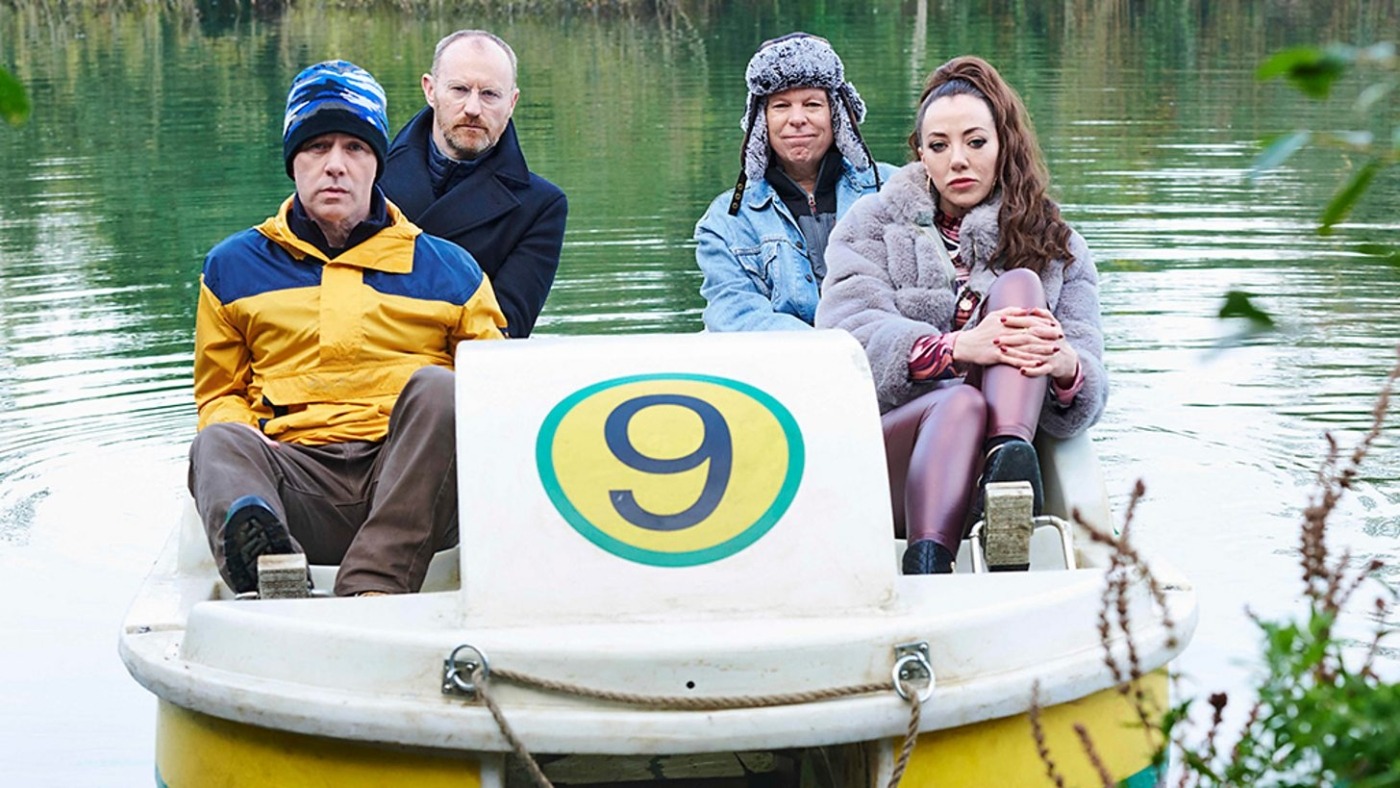Merrily Merrily: ‘Inside No. 9’s most isolated setting ever
To an extent, I’m like a broken record. Every year, I write an Inside No. 9 series blog and sing its praises as one of the best and most inventive shows on TV. Steve Pemberton and Reece Shearsmith’s anthology series has, over six runs, brought us stories that are beautifully crafted, well-acted and frequently toe that fine line between horrific and comedic. It’s now time for a seventh run and, in my time-honoured way, I’m back to sing the show’s praises – on the strength of the incredible ‘Merrily, Merrily’, it looks like it’s going to be another good series.
As tensions flare, it soon transpires that Lawrence may have had a different reason for reassembling the group.
Lawrence (Shearsmith) has arranged a reunion with his two old university friends, Callum (Mark Gatiss) and Darren (Pemberton), at a remote lake. His plan is that the three of them take a pedalo to an island, but he finds that things haven’t gone quite according to plan, not least because Darren has invited along his new girlfriend Donna (Diane Morgan). The group set sail, and casual chit-chat soon leads to the reopening of old wounds and resurfacing memories of the three men’s pasts. As tensions flare, it soon transpires that Lawrence may have had a different reason for reassembling the group.
For many viewers, the immediate selling point of this episode was the presence of Mark Gatiss, Pemberton and Shearsmith’s collaborator on The League of Gentleman (and guest star in the Rope parody episode of Psychoville, a de facto pilot for Inside No. 9). I’ve mentioned in previous blogs that Pemberton and Shearsmith share a natural chemistry as a result of being friends for so long – if you’re telling a story about three old friends, why not bring in the third member of your group? And they all shine – they’re set up as the uptight one (Shearsmith), the superior one (Gatiss) and the loudmouth (Pemberton), but the script lets them go to a lot of other places quite naturally. Lines delivered earlier on come back to hit us hard as secrets are revealed.
Morgan’s role, by contrast, was a mainly comedic presence, getting a lot of great lines yet winding up far more well- rounded than the plot would suggest. Seven series in, and neither writer has lost their ability to craft fully-realised characters within the limits of a 28-minute show – you have a real sense of who these people are, and the conflicts on the pedalo arise as naturally as if we’d been following them for years. It helped, of course, that this is perhaps the show’s most isolated setting ever – director Al Campbell uses stunning shots of the lake to bring home just how far away from anything and anyone the group is.
an ambiguous ending that capped things off beautifully and packed a real punch.
Of course, this is an Inside No. 9, so things may not necessarily be as straight-forward as I’m suggesting (of course, there will be no spoilers here). In the first shot, we see Lawrence staring at a mystery figure on the bank, who may or may not be watching him. And there are hints and undercurrents at something darker in store, as always. But I did not see some of the tonal jumps that ‘Merrily, Merrily’ would make, nor the places to which it would take us. I laughed, I winced, and I even cried a little at this episode, and I was stunned by an ambiguous ending that capped things off beautifully and packed a real punch. Pemberton and Shearsmith leave a number of things unanswered (but suggested), but I think that really works here.
‘Merrily, Merrily’ is a fantastic opener, playing to Inside No. 9’s strengths and playing with its reputation. The cast delivers – the reunion with Gatiss is a real treat, and Morgan proves a welcome fourth member of the trope – and the story is beautifully scripted and delivered. If there’s one thing the show can do well, it’s offering unexpected (but expectedly strong and engaging) treats – ‘Merrily’ Merrily’ is proof of that magic touch.


Comments (1)
What if … his old friends never came to this “reunion”?
Their characters are so two dimensional — the content of their interaction is just his mind’s internal dialog playing out a feel-good farewell story to fill the void of solitude, to give some meaning to what he is about to do — as if the characters are based on web searches of the doctor friend he made in the last ten years and maybe a recent short phone call to his dyslectic friend who informed him that there is a new girlfriend in his life.
Could a self absorbed doctor, preoccupied with his dogs (posting “children” pictures online) and ignoring his old friend’s online invitations consistently, be bothered to reminisce on the past? Not very plausible.
Would a long lost dyslectic friend who found recently a new motivation to live fully by imagining himself being a help-book author, invigorated by his new girlfriend, agree to this party, knowing that his girlfriend has more important engagement elsewhere? Doubtfully.
Would someone, who views himself as being a decent guy, intentionally invite long lost friends who’s life paths took so divergent trajectories to witness his planned exit from world stage and left them stuck in the middle of a lake? Well … to answer this last question, here are a few potentialities of this whole story:
1… he really did invite them and they really came … then they, four friends and no woman present, together pedaled to the island and fire-worked his wife’s ashes, reminisced on the good times and went their separate ways or if they got stuck in the middle of the lake they together found a solution [problem with this version is that the third friend is stuck in Germany which lowers the odds that we are watching this version to zero]; … or
2… he never did invite them and instead imagined them being with him to avoid inconveniencing them and himself with each other’s presence and “they” (he) pedaled to the island, fire-worked wife’s ashes, drank few beers and went separate ways [again in this imaginary version there would be four guys and no woman, although if they got stuck in this improbable version then there would be three guys waiting aimlessly and wondering what to do after their friend jumped into the water and swam to the island]: …or
3… he really invited them, but by not showing up they disturbed his plans to the point that he was forced to improvise on the go imagining them coming into action one by one, sequentially, and also forced him to replace the Germany bound friend with an adhoc female substitution who enters this imaginary story line as the last. The strain of improvisation of this last minute make-believe version, with a female imaginary friend as substitution, caused him to make a big mistake while pedaling to the island, stranding him with his imaginary friends in the middle of the lake. So … by not answering to his invitation, they’ve killed him, or … by inviting them, hoping that they would come while at the same time knowing they wouldn’t show up, he killed himself. After waiting inside the boat house and realizing no one is coming, his gut feeling begins to voice the inevitable notion that once he unlocks the chain securing the pedal boat, he also unlock the chain of events leading to his demise. And he accepts this progression by waving his hand towards the other side. What begun with an invitation (to his friends) destined to remain unanswered would progress with acceptance of chain of self-fulfilling mixed reality events. And by leaving friends stranded he also punishes their virtual representation, although he still wants to make sure they are OK after his death. In a way he is split two fold: split between wanting to punish his absent friends (and thus also himself) for their absence and save them because he is a decent guy (and so are they) and he wants to cling to life by trying to renew his old delusion of friendship while at the same time committing suicide by knowing those friendships can’t be revived since they are illusions of the times past.
I think that he is all alone in that pedal boat. To give his last moments on Earth some meaning, before he unlocks his worldly chain, his ego constructs this scenario of the other three old friends being there with him, but since he knows that the third friend is in Germany his mind fills the vacant seat with his friend’s girlfriend.
Since construction of a meaningful conversation based on scarce input information he has about his old friend, the doctor, takes too much strain on his conscious mind, his mind replaces the doctor friend with this generic type of non-intellectual girl in front seat position. Knowing almost nothing about her, the girl is just copy-paste projection, a female version and an emulated extension of his dyslectic friend. That’s why he is so annoyed with her being there filling in for the third friend stuck in Germany, she is a strain on his imagination, animation of her personae poses a threat to the whole setup loosing its anchoring in real-life experiences of the past.
Also none of the phones are allowed to work in this mind’s-setup, since phone conversations would necessitate additional outside information being injected into his mind’s construction on the go and that new information would have to be invented by his mind as white lies to keep the imaginated farewell party going which would defeat the purpose of his mind’s rendering of this imaginary “reunion” out of very scarce, but genuine real life experiences.
And after the fireworks he is so cold and tired that his mind is not able to conclude the “reunion” story. Imaginary friends are stuck on a boat, his mind wants to resolve their problem, thus mind tries to give them some agency, but their actions are irrational because his brain is unable to imagine the story line that would bring them safely to shore. He collapses and they vanish into darkness. They are both punished (stranded) and then saved (OK) because they were never there.